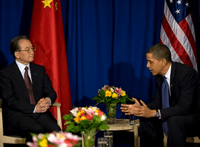The room came to order. The negotiators, some still exasperated by the day's events, sat anxiously awaiting the final results. "Congratulations, delegates," the moderator announced. "You have negotiated a comprehensive successor agreement to the Kyoto Protocol." The delegates erupted in deafening applause, screams of joy and relieved laughter.
No, these were not real-life climate-change negotiators. In August, we designed and ran a daylong scenario to simulate the international climate-change negotiations that will launch in Cancun, Mexico, on Nov. 29. Our goals were to gain a sense of how events may play out in Cancun when the real international negotiators meet to revive a struggling global effort to address climate change and to illuminate important dynamics among the delegates.
Given what we witnessed in our simulation, observers should watch for several potentially important trends in November's real-life Cancun climate-change negotiations.

